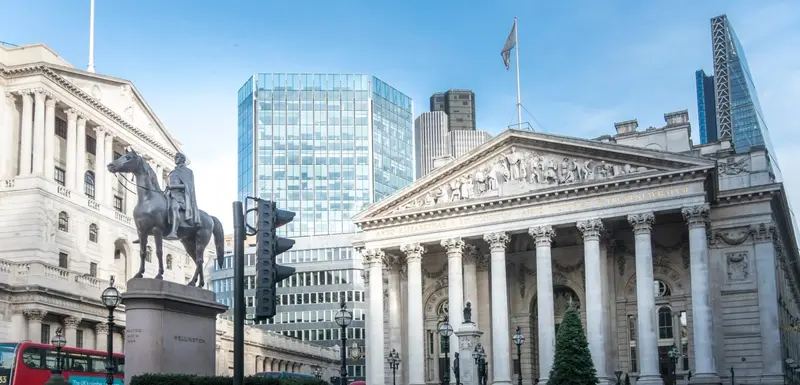
Stocks in London were firmly lower at midday as the latest meeting minutes from the US Federal Reserve indicated that interest rates in the world’s largest economy will remain higher for longer.
The FTSE 100 index was down 100.37 points, or 1.4%, at 7,341.73. The FTSE 250 was down 240.88 points, or 1.3%, at 18,152.45, and the AIM All-Share was down 7.76 points, or 1.0%, at 744.61.
The Cboe UK 100 was down 1.4% at 732.14, the Cboe UK 250 was down 1.3% at 15,887.62, and the Cboe Small Companies was down 1.4% at 12,810.31.
Fed officials signalled they plan to resume interest rate rises believing more tightening is required to tame inflation in the world’s largest economy.
‘Almost all participants noted that in their economic projections that they judged that additional increases in the target federal funds rate during 2023 would be appropriate,’ minutes from the June meeting of the Federal Open Market Committee showed on Wednesday.
Francesco Pesole at ING said it will likely now take some ‘substantial downside surprise’ for markets to reconsider their hiking expectations.
The dollar was weaker on Thursday afternoon, however, as foreign exchange market attention shifted away from the meeting minutes towards incoming data for the US labour market.
The pound was quoted at $1.2770 at midday on Thursday in London, up from $1.2718 at the close on Wednesday. The euro stood at $1.0887, higher against $1.0876. Against the yen, the dollar was trading at JP¥143.88, lower compared to JP¥144.53.
The US weekly jobless claims report will be published at 1330 BST on Thursday. Before then, the US ADP national employment report will be released at 1315 BST. On Friday, the US employment report will be released at 1330 BST.
Analysts at Rand Merchant Bank said the US labour market has been ‘quite resilient thus far’ as 278,000 jobs were added in May by the private sector.
‘Another strong jobs figure in June should further fuel expectations of two more interest rate hikes before the end of the year, with the market currently pricing in around a 50% chance of a hike after the expected 25 basis point increase this month,’ RMB continued.
In London, utility stocks were among the very few blue-chip stocks in the green at midday on Thursday. United Utilities and Severn Trent were up 1.7% and 0.1%, respectively.
The stocks were recovering some of their lost ground after their shares dropped amid the Thames Water crisis.
Last Wednesday, it was reported that the UK government was drawing up contingency plans for the emergency nationalisation of Thames Water as concerns grew over its mammoth £14 billion debt pile.
Housebuilders traded near the bottom of the FTSE 100 after survey data showed activity in the UK construction sector fell month-on-month in June due to a worsening decline in residential work.
Taylor Wimpey, Persimmon, and Barratt Developments were down 2.3%, 2.4% and 2.2%, respectively.
The S&P Global/CIPS UK construction purchasing managers’ index fell to 48.9 points in June from 51.6 in May. Falling below the 50-point no-change mark, it shows the sector has fallen into contraction territory.
June’s reading was lower than FXStreet-cited market consensus of 50.9.
‘UK construction companies signalled a renewed decline in business activity during June as a steep and accelerated downturn in house building weighed on overall workloads,’ S&P Global said.
Currys was the worst performer in the FTSE 250 on Thursday afternoon, down 12%, after the electrical goods retailer pulled its dividend amid continued trouble in the Nordics region.
Currys swung to a pretax loss of £450 million in the year ended April 29, from a profit of £126 million the year prior. Revenue decreased by 6.2% to £9.51 billion, from £10.14 billion.
As a result of the difficulties, Currys declared no final dividend for its financial year.
Russ Mould, investment director at AJ Bell, said the ‘big frustration’ for Currys is it has made decent strides in getting its business in the UK and Ireland on track, despite the difficult consumer backdrop putting pressure on sales.
‘Profit in this part of the business was up by an eye-catching 45% as it eked out significant cost savings to compensate for lower volumes,’ Mould said.
Elsewhere in London, Hunting surged 22% after the energy services firm said its trading in the first half of the year has beat its expectations, driven primarily by strength across international markets.
As a result, the company said both revenue and operating profit are set to be ahead of its targets set at the beginning of the year.
Hunting increased guidance for earnings before interest, tax, depreciation and amortisation to between $96 million to $100 million, expecting $48 to $50 million in the first half.
On AIM, Petro Matad rocketed 59% after it announced that the Mongolian government has approved the certification of the Block XX Exploitation area, which includes the Heron oil discovery, as special purpose land.
Chief Executive Officer Mike Buck said: ‘This important step has been a very long time coming but now provides a firm legal standing to the company to execute the approved plan of development for Heron and to explore the exciting potential around it.’
In European equities on Thursday, the CAC 40 in Paris was down 1.7%, while the DAX 40 in Frankfurt was down 1.2%.
Stocks in New York were called lower on Thursday. The Dow Jones Industrial Average, the S&P 500 index and the Nasdaq Composite all called down 0.4%.
Brent oil was quoted at $76.61 a barrel at midday in London on Thursday, up from $76.54 late Wednesday. Gold was quoted at $1,923.18 an ounce, slightly lower against $1,924.40.
Copyright 2023 Alliance News Ltd. All Rights Reserved.




